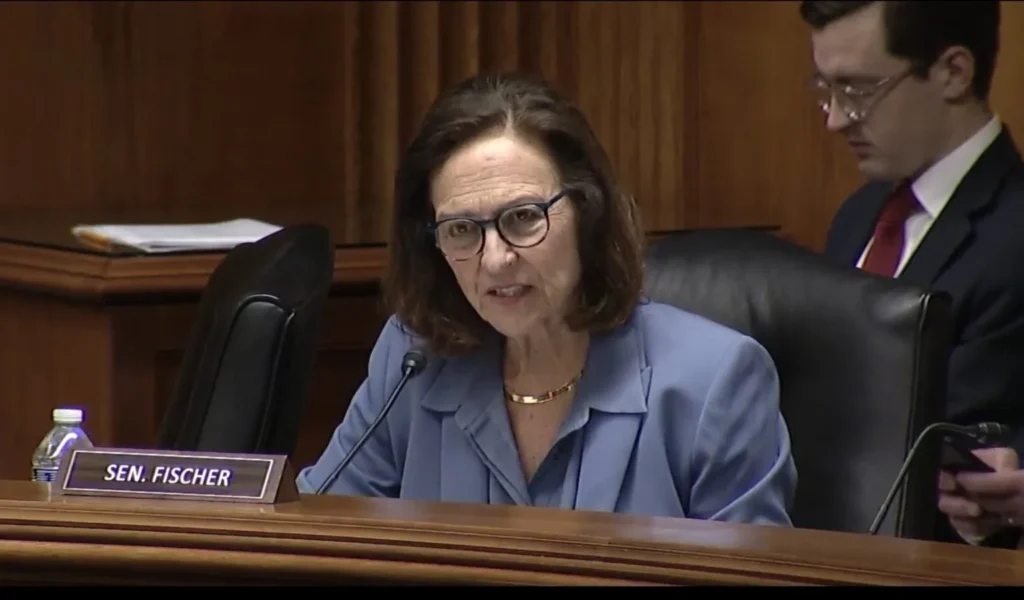Deb Fischer Net Worth
From Nebraska Ranch to United States Senate
The American political landscape features numerous compelling stories of public service. Deb Fischer represents one of the most interesting journeys from agricultural roots to federal legislation. Her path from managing a family cattle ranch to serving as Nebraska’s senior United States senator demonstrates how diverse experiences can shape political leadership. This examination explores Deb Fischer’s net worth, tracing her financial trajectory through agricultural management, state politics, and federal legislative service while analyzing how her background continues influencing her policy positions and political identity.
Table of Contents
Deb Fischer Net Worth: Understanding Senate Financial Disclosure
Deb Fischer’s estimated net worth ranges between $10-20 million. This substantial wealth primarily derives from agricultural assets and investments. Her financial standing reflects successful ranch management and prudent investment strategies. The Fischer family’s cattle operation represents significant agricultural asset value. Additional investments and retirement accounts contribute to overall wealth. Senate financial disclosures provide detailed asset information annually.
Agricultural Asset Valuation
The Fischer family ranch spans thousands of Nebraska acres. This land represents their most valuable financial asset. Cattle operations generate consistent annual revenue streams. Agricultural land appreciation has increased portfolio value substantially.
Investment Portfolio Composition
Various investment accounts supplement agricultural income. Retirement funds and stock investments provide diversification. These accounts have grown through consistent contributions and market performance. The portfolio reflects conservative investment philosophy.
Senate Salary and Benefits
The congressional salary currently stands at $174,000 annually. This represents reliable income during Senate service terms. Federal benefits and retirement plans add financial security. The salary supplements existing agricultural and investment income.
Early Life and Agricultural Background
Deb Fischer was born March 1, 1951, in Lincoln, Nebraska. Her childhood combined educational opportunities with agricultural experiences. She attended the University of Nebraska-Lincoln for undergraduate studies. Her educational background included early interest in political science.
Educational Foundation Development
Her university studies focused on political science initially. This academic interest later informed her political career. Educational experiences provided theoretical government understanding. Practical agricultural experience complemented academic learning.
Marriage and Partnership Formation
She married Bruce Fischer in 1972 following college graduation. Their partnership combined shared agricultural interests and ambitions. The couple began building their ranching operation together. This partnership proved crucial for future business success.
Ranch Establishment Process
The Fischer family established their cattle operation gradually. Initial land acquisitions required careful financial planning. The operation expanded through strategic purchases over decades. Agricultural management skills developed through practical experience.
Nebraska Legislature Political Career
Fischer’s political career began at the state legislative level. She served in the Nebraska Legislature from 2005 through 2013. Her committee assignments reflected agricultural and transportation interests. This state-level experience provided crucial governing experience.
Initial Election Campaign
Her first legislative campaign focused on local issues. Rural representation concerns resonated with district voters. The campaign emphasized her practical agricultural background. This authentic connection proved electorally successful.
Legislative Committee Work
Her committee assignments included transportation and agriculture. These positions aligned with her background and interests. Committee work developed specialized policy expertise. The experience informed her future federal legislative priorities.
Political Philosophy Development
Her state legislative service shaped governing approach. Practical problem-solving characterized her legislative style. Bipartisan cooperation on certain issues emerged gradually. This period established her political identity foundations.
United States Senate Election Victory
Fischer’s 2012 Senate campaign attracted national attention. The open seat created a competitive Republican primary contest. Her victory against established opponents demonstrated political skill. The general election maintained Nebraska’s Republican Senate tradition.

Primary Election Challenge
The Republican primary featured multiple strong candidates. Fischer trailed in early polling and fundraising metrics. Her campaign gained momentum through effective messaging. Rural voter support proved decisive in primary victory.
General Election Strategy
The general election emphasized her Nebraska roots. Agricultural background differentiated her from opponents. Campaign messaging highlighted state legislative experience. This approach maintained traditional Republican electoral advantage.
Committee Assignments Selection
Senate committee assignments reflected state interests. Armed Services Committee placement addressed Offutt Air Force Base. Agriculture Committee position served farming constituents. These assignments have continued throughout Senate service.
Senate Career and Legislative Focus
Fischer’s Senate service has emphasized several policy areas. Agriculture and national security represent consistent priorities. Her legislative style combines conservative principles with practical governing. Committee work has produced significant legislative achievements.
Agricultural Policy Leadership
Her Agriculture Committee work addresses farm programs. Crop insurance and risk management receive particular attention. Livestock industry issues reflect constituent interests. Farm bill reauthorization processes involve extensive involvement.
Armed Services Committee Role
Military personnel issues receive consistent attention. Offutt Air Force Base protection remains priority. Defense authorization bills require detailed committee work. Military modernization and readiness inform policy positions.
Transportation Infrastructure Focus
Surface transportation reauthorization represents a key issue. Highway and bridge funding affects Nebraska directly. Rural transportation needs receive particular emphasis. Bipartisan cooperation has produced legislative results.
Political Philosophy and Electoral Strategy
Fischer’s political approach combines conservative principles with practical understanding. Electoral success stems from understanding constituent interests. Policy positions generally align with the Republican conference. Independent stances emerge on certain Nebraska-specific issues.
Conservative Voting Record
Her Senate votes typically support Republican positions. Judicial confirmations follow party consensus patterns. Tax and regulatory policies reflect conservative philosophy. Spending limitations represent consistent priority.
Constituent Service Emphasis
Nebraska interests frequently influence policy positions. Agricultural programs receive bipartisan support when beneficial. Military installation protection transcends partisan considerations. This approach has maintained electoral support.
Electoral Competition Management
Potential challengers have emerged in primary contests. General election opponents have included credible candidates. Campaign resources have been deployed effectively when needed. Electoral success has been consistently achieved.
Financial Disclosure Requirements
Senate ethics rules require detailed financial disclosure. Annual reports document assets and income sources. These disclosures provide transparency about potential conflicts. The reports enable net worth estimation and tracking.
Asset Reporting Categories
Agricultural assets require detailed reporting. Investment accounts must be disclosed within value ranges. Retirement accounts and funds appear in separate categories. Spousal assets necessitate inclusion in reports.
Income Source Documentation
Senate salary represents one income source. Agricultural revenue requires annual reporting. Investment income must be specifically categorized. Spousal income sources necessitate full disclosure.
Potential Conflict Evaluation
The Senate Ethics Committee reviews disclosures. Potential conflicts require recusal from certain matters. Agricultural interests necessitate particular attention. The process aims to maintain public trust.
Agricultural Operations Management
The Fischer family ranch continues operating during Senate service. Management responsibilities have been adjusted accordingly. The operation represents a working agricultural business. Its success demonstrates effective business management.
Cattle Operation Scale
The ranch maintains a substantial cattle herd. Breeding and feeding operations continue full-scale. Market conditions affect annual revenue significantly. Operational decisions require ongoing attention.
Land Management Practices
Sustainable agricultural methods are employed. Conservation programs participation occurs when appropriate. Drought conditions necessitate adaptive management. Agricultural expertise informs policy positions.
Business Structure Details
Family partnership manages operational decisions. Professional advisers provide specialized guidance. Operational continuity is maintained during Senate service. Business success continues despite political responsibilities.
Campaign Finance and Political Spending
Senate campaigns require substantial financial resources. Fischer’s campaigns have utilized various funding sources. Individual contributions and political committees provide support. Spending patterns reflect strategic resource allocation.
Fundraising Source Analysis
Individual Nebraskans provide contribution base. Agricultural interests represent significant support source. National Republican committees provide additional resources. Fundraising success has enabled competitive campaigns.
Expenditure Pattern Review
Media purchases represent major campaign expense. Staff and operational costs require careful management. Voter contact programs receive funding priority. Financial efficiency has characterized campaign operations.
Political Action Committee Support
Agricultural PACs provide consistent support. Business-oriented committees contribute regularly. Ideological organizations offer endorsement and funding. This diverse support base ensures financial competitiveness.
Personal Life and Family
Fischer maintains Nebraska residence during Senate service. Family connections remain important personally and politically. Her marriage represents long-term partnership. Adult children maintain separate professional careers.
Family Business Involvement
Spousal management handles operational details. Family members provide additional management support. Agricultural knowledge informs business decisions. The operation remains a family-centered enterprise.
Nebraska Residence Maintenance
Washington requirements necessitate temporary residence. Nebraska home maintains primary residence status. Regular state travel maintains constituent connections. This balance preserves political authenticity.
Committee Leadership Roles
Senate seniority has brought committee leadership opportunities. These positions enhance legislative influence significantly. Nebraska interests benefit from leadership roles. Policy priorities advance through strategic positions.
Armed Services Subcommittee Chair
Military personnel subcommittee oversees key programs. Defense policy development occurs through this platform. Nebraska military installations receive particular attention. The position provides national security influence.
Agriculture Committee Ranking
Republican committee position brings influence. Farm bill development involves central role. Agricultural research programs receive oversight responsibility. Nebraska agricultural interests benefit substantially.
Future Political Prospects
Senate reelection appears likely if sought. Committee leadership positions may expand. Potential leadership opportunities could develop. Political influence seems positioned to grow.
Electoral Security Assessment
Strong Nebraska support base exists. Republican Party backing remains consistent. Fundraising capability ensures competitive resources. No obvious successor has emerged.
Policy Influence Projection
Agriculture policy expertise brings increasing influence. Military committee role provides national platform. Seniority accumulation enhances legislative effectiveness. Future leadership positions represent natural progression.
Frequently Asked Questions
Conclusion
Deb Fischer’s estimated $10-20 million net worth reflects agricultural success. Her political career demonstrates consistent electoral appeal. Policy expertise has developed through committee service. Nebraska interests remain central to legislative focus. The combination of agricultural management and political service represents an unusual career path. Financial disclosure provides transparency about asset composition. Senate service continues bringing policy influence. Fischer’s story illustrates how private sector experience can inform public leadership.







